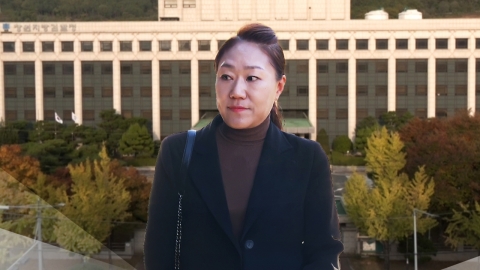■ Starring: Professor Chae Sang-mi, Department of Business Administration at Ewha Womans University
* The text below may differ from the actual broadcast content, so please check the broadcast for more accurate information. Please specify [YTN News START] when quoting.
[Anchor]
We deliver the latest economic news quickly and kindly. Start Economy, today we will be with Chae Sang-mi, a professor of business administration at Ewha Womans University. Please come in. Let's talk about Bitcoin, which has been rising endlessly without knowing where the high point is, but I think we're starting to catch our breath ahead of the $100,000 mark.
[CHAE SANGMI]
It's going through a little adjustment ahead of $100,000, but last month alone it was $70,000. However, Bitcoin is rising very rapidly, and it is believed that the good news of former President Trump's victory in the presidential election has stimulated market sentiment. Bitcoin is now attracting attention again among global investors. Currently, breathing is evaluated as a result of a combination of technical adjustments and investors' profit realization. According to experts, this is a natural process to prepare for the next rise.
[Anchor]
As the anchor mentioned earlier, it's really going up endlessly, but as an expert, what if you could predict how long this rise will continue in the future?
[CHAE SANGMI]
Not only me, but experts say that Bitcoin will rise in the long term, so I'm optimistic. For example, Ark Invest founder Cathie Wood is predicting that Bitcoin could reach about $1.5 million by 2030. Then, Michael Novogra of Galaxy Digital predicts that if Bitcoin settles down as a strategic asset, it could rise to $500,000. However, there are also global regulatory movements in stages. Then, since market volatility has become very large, we have to look at it carefully and we need to be careful when investing because regulatory risks may temporarily limit the upward momentum.
[Anchor]
It is also a reality that there are various voices of concern over Bitcoin, so first of all, there is a content that the Financial Supervisory Service will take action in Korea. What is it about?
[CHAE SANGMI]
The Financial Supervisory Service said, "Since market volatility has increased very much recently, we will check the abnormal transaction monitoring system centered on the virtual asset exchange to cope with this." This seems to be a measure to secure market stability as well as investor protection. Specifically, the internal control of the exchange will be strengthened, and the standards for preventing unfair transactions and then enhancing transaction transparency will be prepared, and the focus will be on this. Next, we are also discussing a legalization system that clarifies the scope and definition of virtual assets. Through this, it can be seen that increasing investor confidence is the FSS' main goal.
[Anchor]
But professor, not only bitcoin, but also other coins are on the rise right now. As a result, the controversy over the taxation of virtual assets seems to continue.
[CHAE SANGMI]
Starting next year, a taxation policy that applies a 22% tax rate will be implemented if virtual asset income exceeds 2.5 million won, which is very controversial. The reason is that the proponents argue that if there is income from the standpoint of tax equity, taxation should be done. From the standpoint of expanding tax revenue, the need for taxation is emphasized. In the background, major countries such as the United States, Japan, and the United Kingdom are already taxing virtual assets. So you can think of it as being in line with this policy. On the other hand, the opposition side is young investors due to the low deduction limit and 2.5 million won, and most of them are young. So we're talking about the possibility of excessive tax burden. Next, there is institutional instability about the legalization of self-custodial assets. So it's not right to tax it directly when there's a lack of preparation. That's why I'm asking for a tax deferral. In particular, there is a possibility that it will lead to a contraction in investment sentiment among young people, so the controversy is growing.
[Anchor]
As you mentioned, it is scheduled to be implemented in January next year, but isn't there a possibility that this will be suspended because more than 60,000 people have agreed to it in two days?
[Chae Sang-mi]
The timing of taxation is hasty. During the grace period, systematic supplementation should be made. So it's not easy to implement it right now, but as you know, 60,000 people agreed for two days is an example of this public opinion. So, in the end, I think that whether or not to suspend taxation will require political consensus and then be determined according to public opinion.
[Anchor]
There seems to be a lot to review. We'll continue to look at the New York Stock Exchange prospects, but there's Thanksgiving in the United States this week. Will there be an impact? What should I pay attention to?
[CHAE SANGMI]
The New York Stock Exchange is originally closed on the 28th and early on the 29th during Thanksgiving week. So the total trading day will be reduced to 3.5 days. So it's very likely that this will result in a decrease in trading volume and also increase market volatility. Therefore, we believe that if economic indicators or policy announcements are made while trading volume is very weak, price movements may be excessively reflected and that short-term investment strategies need to be noted.
[Anchor]
There's also the release of the Federal Reserve minutes, so I'll pay attention to that. To return for a moment to domestic conversation, there is Lotte Group, which is ranked 6th in the business world. There was once a lot of noise about the liquidity crisis, but what's the reason?
[CHAE SANGMI]
This caused controversy by declaring a Lotte Group moratorium online or on social media and then 78,000 job cuts. As a result, it turned out that this is a groundless rumor. However, this can be seen as a major example of stimulating market anxiety and affecting stock volatility.
[Anchor]
However, some analysts say that the poor performance of affiliates should be considered true to some extent, although it has been revealed as a rumor. What do you think of Lotte Group's crisis theory?
[CHAE SANGMI]
First of all, Lotte Chemical and Lotte Shopping are actually deteriorating due to the combination of major affiliates, and due to the sluggish economy. Then, it is true that we are experiencing poor performance due to market changes. So, for example, in the case of Lotte Chemical, the petrochemical industry is stagnating, and in 2021, it recorded an operating profit of 1.5 trillion won. However, last year, it recorded an operating loss of 300 billion won. However, at the overall Lotte Group level, it has more than 109 trillion cash liquidity, which consists of about real estate deposit stocks. So the stock market's evaluation is that there is no problem with short-term liquidity. This is how the sluggish performance of some affiliates was interpreted as expanding into a liquidity crisis for the entire group.
[Anchor]
First of all, Lotte has entered the emergency management system because the sluggish performance is being confirmed according to which affiliates and the outlook is not so good in the future. How can we see the prospects of the business going forward?
[CHAE SANGMI]
Lotte's offline stores are very difficult. We are promoting convergence digital transformation by utilizing offline store strengths and strengthening experiential content. So efforts are being made to secure competitiveness in this, so we'll have to wait and see. In addition, Lotte Chemical is also making various efforts to secure more than 4 trillion won in liquid funds to repay corporate bonds and solve short-term financial problems. So Lotte is showing signs of restoring trust through a strategy that focuses on mid- to long-term investment rather than focusing on short-term gains and losses, and investors should keep an eye on it.
[Anchor]
We will see how it will flow because it is foreshadowing personnel reform and management reform in the mid- to long-term. This is the last topic. The Korea Franchise Industry Association announced that it would raise delivery chicken again.
[CHAE SANGMI]
This is trying to push for a double pricing system. The agreement was made in such a way that the brokerage fee was reduced from 9.8% to 7.8% by creating a win-win consultative group for delivery apps, but the burden of delivery costs was also transferred to the store owner. I'm going to set the price of delivery and menu a little higher than the store price. I'm going to use a double price system. This is a situation where this movement is taking place.
[Anchor]
It's not that I'm going to raise it, but I can cut it, did you negate this possibility?
[CHAE SANGMI]
I will calculate a different price by adding a delivery price to the delivery menu rather than a reduction. This is the focus.
[Anchor]
In fact, chicken prices continued to rise as raw materials and labor costs continued to rise. If you put it in, one chicken will exceed 30,000 won, and in the end, if the double price system continues, won't the phenomenon of continuing to pass on those burdens to consumers?
[CHAE SANGMI]
That's right. In the long run, implementing the double price system has the effect of reducing the demand for delivery itself. Therefore, it can have a very negative impact on the sales structure of restaurant franchises. Consumers can be very sensitive to price comparisons. So, there is a possibility that demand will shift to smaller stores than large franchises. So, I think that the franchise industry should do something to ease the burden of store owners, but it should pursue a balanced policy that can maintain consumer trust. For example, we believe that a transparent pricing policy and an improvement in the structure that can share delivery costs are necessary.
[Anchor]
That's all for today. Start Economy Today, I was with Chae Sang-mi, a professor at Ewha Womans University. Thank you.
※ 'Your report becomes news'
[Kakao Talk] YTN Search and Add Channel
[Phone] 02-398-8585
[Mail] social@ytn. co. kr
[Copyright holder (c) YTN Unauthorized reproduction, redistribution and use of AI data prohibited]
Economy
More- Lee Jae-yong ranks 85th as 'most influential businessman' by Pocheon
- [Video] 'Hot Potatoes' Virtual Assets Taxed...In the end, season 2 of gold fighting?
- Experts said, "The manufacturing situation is likely to worsen in December...Trump's Return Affects"
- Starting next year, the supply of apartments in the Seoul metropolitan area will become a reality...House prices are going up and down again?

![Samsung Electronics, which was sued for a semiconductor patent in the U.S., should compensate KRW 166 billion. [Now News]](https://image.ytn.co.kr/general/jpg/2024/1125/202411250754264953_h.jpg)
![[Reporting Y] Used transactions. Fraud damage.Let's get the money. Out of contact.](https://image.ytn.co.kr/general/jpg/2024/1125/202411250508312962_h.jpg)


![[Y Issue] Fans are shocked by Jung Woo-sung's recognition as a handsome man...Comment prediction → Marriage Hall re-examination (Roundup)](https://image.ytn.co.kr/general/jpg/2024/1125/202411250853425373_h.jpg)



